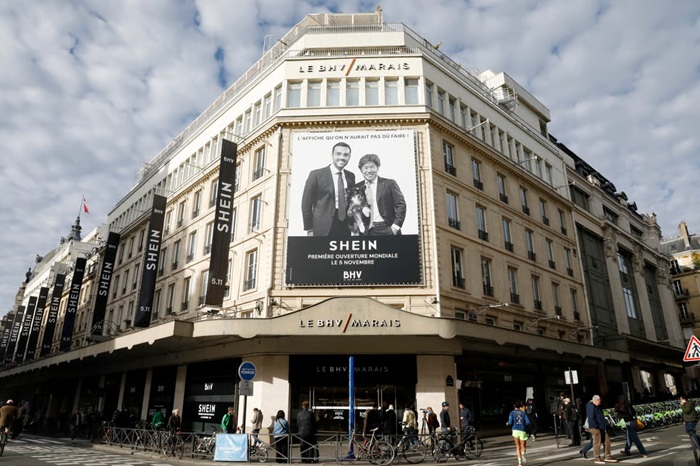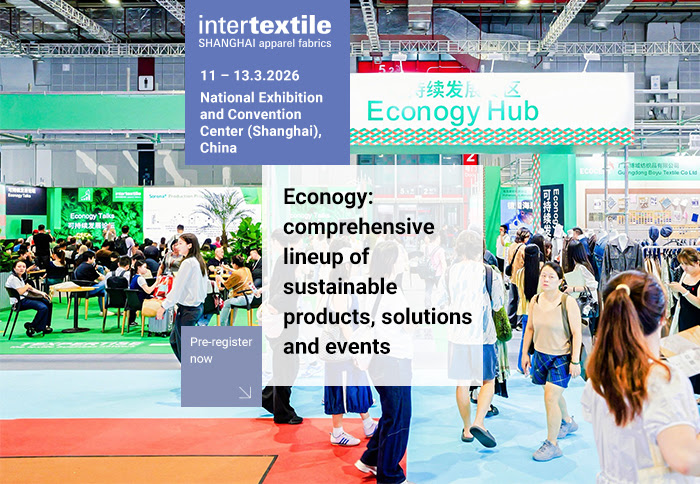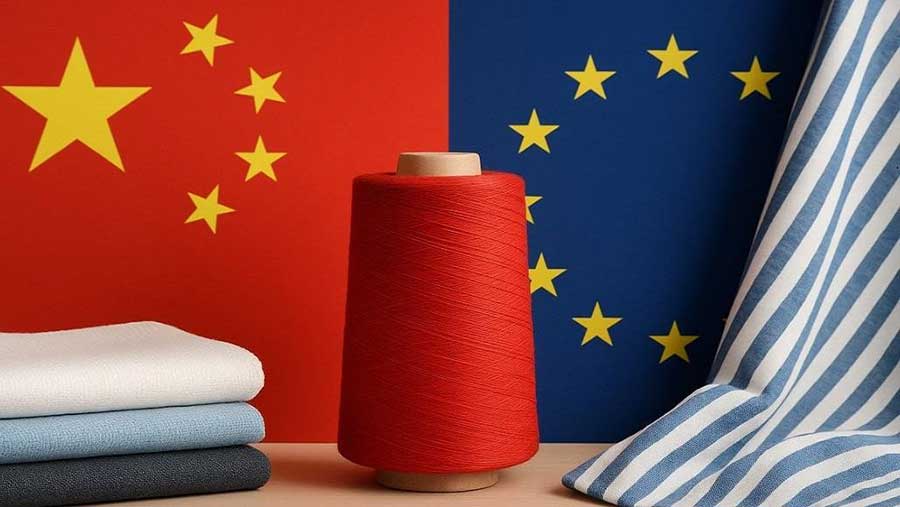FW

The global textile industry has always lived with thin margins, long lead times, and unforgiving working-capital cycles. But the latest war in the Middle East has exposed just how fragile that balance really is. What began as a regional military escalation between the US-Israel alliance and Iran has rapidly mutated into a full-blown commercial crisis for fiber producers, spinning mills, fabric processors, and garment exporters. With the Strait of Hormuz under disruption and the Bab-el-Mandeb corridor classified as high risk, the maritime arteries that feed raw materials into textile factories have slowed to a crawl.
For an industry where yarn often moves across three countries before becoming a finished shirt, every extra day at sea compounds cost. And every dollar added to freight chips away at already lower margins. The result is not just a logistics problem. It is a structural repricing of the global textile business.
Ocean freight is the new cost center
The most immediate impact is visible on the water. Carriers that once relied on the Suez Canal are now bypassing it entirely steering vessels 3,500 nautical miles around the Cape of Good Hope. The detour adds weeks to shipping schedules and effectively removes capacity from the system. Ships that used to complete three Asia-Europe rotations per quarter now manage barely two.
World Bank and JPMorgan Chase statistics show that these longer voyages are tightening container availability and inflating freight benchmarks at the fastest pace since the pandemic. The numbers illustrate the stress building inside textile supply chains.
Table: Textile supply chain freight cost pre and post conflict
|
Metric |
Pre-conflict (Jan 2024) |
Current crisis (March 2026) |
% Change |
|
Asia-Europe Freight Rate (40ft) |
$1,500 - $2,000 |
$4,500 - $6,200 |
+210% |
|
Transit Time (India to UK) |
22 - 25 Days |
42 - 50 Days |
+95% |
|
War Risk Insurance Premium |
0.05% of hull value |
0.75% - 1.0% of hull value |
+1,400% |
|
Crude Oil (Brent) |
$78/barrel |
$95 - $110/barrel (est.) |
+25% - 40% |
For textile exporters, this is more than an accounting headache. Freight is now eating into 6-10 per cent of order value on basic garments, a ratio that makes many low-margin styles commercially unviable. Factories that priced spring collections six months ago are suddenly absorbing costs they never modelled.
When oil prices rewrite fiber economics
The crisis is not confined to ships and ports. It is working its way upstream into the chemistry of textiles themselves. Synthetic fibers like polyester, nylon, acrylic are derived from petrochemicals. When crude rises, so do the costs of Purified Terephthalic Acid (PTA) and Monoethylene Glycol (MEG), the building blocks of polyester.
With Brent flirting with $110 per barrel, polyester markets have entered near-daily price discovery. Indian Polyester Staple Fiber has already climbed into the $1,150-$1,250 per metric ton band. Chinese export offers hover near $1,000/MT, but mills report volatility that makes forward contracting risky. This matters because synthetics are no longer a niche input. They dominate modern apparel.
Today, more than half of global clothing which is about 56 per cent is polyester-based. That means every energy shock cascades directly into spinning, weaving, knitting, dyeing, and finishing costs. Clusters in Surat and Ludhiana report a familiar squeeze: raw material inflation of 5-8 per cent, but European buyers unwilling to accept price revisions. Margins are being shaved at the mill gate. Some smaller processors have quietly reduced shifts rather than run loss-making orders.
The just-in-time model breaks down
The deeper casualty may be the industry’s faith in speed. For two decades, brands perfected just-in-time sourcing. Produce in South Asia; ship through Suez; ;and in Europe in three weeks; replenish quickly. That system now looks outdated.
One large European fashion conglomerate sourcing nearly half its seasonal knitwear from South Asia recently saw 120,000 units rerouted around Africa. The detour alone added $1,800 per container. More damaging was timing. The goods missed the Easter retail window, triggering early markdowns and a projected 15 per cent drop in full-price sales. To save the best-selling designs, the company resorted to air freight, pushing logistics cost per garment from $0.15 to over $2. Such emergency airlifts may protect sales, but they destroy margin structure. For textiles, which operate on pennies per piece, that math simply doesn’t work.
Nearshoring moves from theory to strategy
These disruptions are increasing a sourcing shift that had been discussed for years but rarely executed. Brands are now prioritizing geography over pure labor arbitrage. Proximity is being priced as insurance. Manufacturing corridors in Turkey, Egypt, and Eastern Europe are seeing renewed inquiries, even though their wages exceed those in South Asia. What they offer instead is predictability that is five to seven days of transit instead of 40.
For mills in India, Vietnam, and Bangladesh, the message is clear: cost competitiveness alone is no longer enough. Reliability has become a selling point. Factories that can stock greige fabric locally or maintain bonded warehouses near consumer markets are suddenly more attractive partners.
Sanctions, trade rules add friction
The conflict has also complicated compliance. Iran’s specialized fiber and carpet exports have largely disappeared from international trade, creating temporary opportunity for alternative suppliers. But new tariffs and origin scrutiny are offsetting those gains.
The US has introduced broad import duties and intensified audits of value addition. Exporters using Chinese yarn or fabrics inside Vietnamese or Cambodian garments now face deeper documentation checks. Containers routed through high-risk straits are more frequently flagged for inspection, adding demurrage and storage costs at West Coast ports. In an industry built on tight calendars, even three extra days at customs can wipe out profitability.
A $1.8 trillion industry reconsiders its model
The broader backdrop makes the shock even more consequential. The global apparel and textile market is expected to approach $1.86 trillion next year, but growth has slowed while uncertainty has multiplied. Major global players such as Inditex, H&M Group, and Adidas are leaning harder into direct-to-consumer channels, inventory analytics, and higher-value smart or performance fabrics to protect profitability. The logic is straightforward: if logistics costs are rising permanently, margins must be rebuilt through product differentiation rather than scale alone.
Commodity T-shirts are losing appeal. Technical textiles, recycled polyester, and functional fabrics carry better pricing power. For mills, the implication is profound. Competing only on volume is becoming dangerous. Value addition is the new buffer.
What the Red Sea disruption ultimately reveals is that textile supply chains were optimized for stability, not volatility. For years, the equation was simple: cheapest labor plus predictable shipping equals profit. That formula no longer holds. Now the calculus includes insurance premiums, rerouting days, fuel volatility, sanctions risk, and geopolitical chokepoints.
In effect, freight has become the new raw material. And just as cotton or polyester prices dictate mill viability, shipping economics now determine which countries remain competitive. If disruptions persist, the global textile map may look very different within five years. Production could fragment across regional hubs. Inventory buffers may replace lean pipelines. And proximity to consumer markets may matter more than wage differentials. For an industry built on thread, the seams are showing. But the businesses that adapt by diversifying fiber sources, investing in technical textiles, and shortening supply chains may emerge stronger. Because in today’s textile trade, resilience has become the most valuable fabric of all.

When Shein finally planted a permanent retail flag in Paris, the move looked symbolic as much as strategic. The company that perfected algorithmic fashion churning out thousands of new designs daily and delivering €5 impulse buys to smartphones across Europe chose to debut its first enduring brick-and-mortar presence inside BHV Marais, one of the city’s most storied department stores.
On paper, the partnership promised a neat coming together of: digital scale meets heritage retail. In practice, it has turned into something closer to a stress test, of pricing, regulation, culture and the basic economics of fast fashion when removed from the frictionless world of apps and warehouses. The experiment reveals a blunt truth: what thrives in the infinite aisle of e-commerce does not automatically translate to the finite realities of physical retail.
Europe’s silent digital takeover
Long before it ever rented shelf space in central Paris, Shein had already embedded itself into everyday wardrobes across the continent. Its growth was not loud or brand-driven in the traditional sense. It was mathematical, powered by search algorithms, micro-trend detection and relentless price compression. By mid-2025, the company’s monthly active users in the EU rivalled those of legacy fashion groups built over decades.
Table: Shein’s top EU markets by monthly users (2025)
|
Country |
Monthly Users (mn) |
Economic impact/role |
Market insight |
|
France |
27.8 |
€5.2 bn economic output |
Highest cultural influence; strong resistance to non-local trends. |
|
Spain |
25.8 |
€3.0 bn economic output |
Heavy engagement; world leader in TikTok traffic per capita. |
|
Italy |
23.9 |
€3.6 bn economic output |
Strongest growth in Gen Z and Gen Alpha demographics. |
|
Germany |
25.7 |
€7.2 bn economic output |
Revenue powerhouse; highest GDP contribution in the EU. |
|
Poland |
8.8 |
€920 mn economic output |
Critical logistics and e-commerce hub for Eastern Europe. |
Source: CedCommerce / AWISEE Report 2025 The table illustrates two critical dynamics. First, France is both opportunity and contradiction: Shein’s largest audience, yet also the most sceptical. The country that built luxury maisons and artisanal craft traditions is now the platform’s single biggest user base. Second, scale clusters around digitally mature, youth-heavy markets. Spain and Italy show engagement intensity, while Germany delivers monetisation. Poland’s role as a logistics hub hints at the operational backbone enabling 10-day delivery promises.
This user growth also translated into sheer physical movement of goods. Low-value e-commerce parcels entering the EU jumped 26 per cent to 5.8 billion shipments in 2025, with Shein and rival platforms driving much of the increase. In effect, Europe’s postal system became an extension of Shein’s warehouse.
From infinite scroll to finite shelf
Yet what works when a consumer scrolls through 7,200 new listings a day becomes complicated when confronted with racks, mirrors and rent. The BHV corner in Paris initially felt like a novelty. Shoppers queued out of curiosity. TikTok creators filmed IRL Shein hauls. Footfall looked promising. Conversion, however, told a different story.
Table: Shein’s Paris store reality (late 2025, early 2026)
|
Metric |
November 2025 (Launch/BFCM) |
January 2026 (Current) |
Variance / Trend |
|
Daily Sales Revenue |
€50,000 (Peak spikes) |
€2,000 - €5,000 (Steady state) |
↓ 90% (Normalization) |
|
Operating Cash Registers |
7 Active (Pop-up/Event focus) |
1 Active (Long-term anchor) |
Consolidation to 1 unit |
|
Average Item Price |
€9 (Entry-level impulse) |
€30 - €45 (Mid-tier/Premium) |
↑ 300% (Intent-driven) |
|
Public Sentiment |
Curious / Experimental |
58% Negative Perception (FR) |
Shift to prudence/pragmatism |
|
Seller Commission |
5% (Incentive rate) |
9% (Standardized rate) |
Platform maturation |
Source: Institut Français de la Mode / Industry Reports The data captures the arc of enthusiasm turning into hesitation. Revenue fell by over 90 per cent within weeks. Seven cash registers were reduced to one. Most tellingly, the price delta widened dramatically. A €9 online item ballooned to €30-€45 in-store once rent, staffing and inventory risks were added. That gap erodes Shein’s core promise: hyper-affordability.
Digital shoppers forgive thin fabrics or inconsistent sizing when the price feels negligible. Inside a physical store, expectations change. At €40 for jeans, comparisons shift to Zara, H&M or Uniqlo. The psychological advantage disappears. The paradox becomes clear: Shein’s strength ultra-low cost through centralised logistics and direct shipping is exactly what a store undermines.
When policy overtakes platform speed
If operational friction weren’t enough, timing compounded the challenge. Just as Shein opened its doors, France tightened the screws on ultra-fast fashion with one of the toughest regulatory frameworks in Europe. New measures include:
• An eco-tax starting at €5 per item, rising to €10 by 2030
• A sweeping advertising ban targeting ultra-fast fashion promotions and influencer marketing
• Heightened scrutiny of product safety and sustainability claims
• At the continental level, the pressure intensified further. On February 17, 2026, the European Commission launched formal proceedings under the Digital Services Act, examining allegations of addictive design features and the sale of non-compliant products. For a company built on constant nudges, flash drops and gamified shopping behaviour, such oversight strikes at the heart of its growth engine. The store in Paris, therefore, isn’t just a retail experiment. It has become a regulatory lightning rod.
The true price of the €9 outfit
Behind the policy debate lies a deeper tension: affordability versus accountability. French shoppers spend an average of €9 per Shein item, a price point almost impossible for traditional retailers to match while maintaining European labour and sourcing standards. During an inflationary cycle, that difference matters.
But the environmental bill is harder to ignore. Shein’s reliance on air freight to meet rapid production-to-door cycles has pushed emissions sharply upward reportedly rivalling the annual footprint of countries such as Lebanon. Consumers feel the contradiction. Surveys show a majority want sustainable wardrobes, yet budget realities dictate otherwise. The Paris storefront captures this divide in real time: teenagers queuing for bargains on one side of the street; protesters holding placards reading ‘Shein C’est Non’ on the other. It’s not merely a brand clash, it’s a generational and economic fault line.
The broader question now confronting Shein is structural: can an ultra-fast, digitally native supply chain coexist with the slower economics of physical retail?
Traditional stores demand: higher margins, curated assortments, predictable inventory and brand storytelling. Shein’s model thrives on: endless assortment, ultra-low margins, rapid testing, disposable consumption
These systems operate on opposing logics. The BHV partnership shows that footfall alone doesn’t guarantee success. Without a compelling price advantage or elevated brand value, the physical format becomes a liability rather than an amplifier.
More than a store, a signal
Seen narrowly, the Paris venture looks like an underperforming pilot. Seen broadly, it’s a bellwether for the future of global fast fashion. If the most digitally dominant player struggles to convert clicks into bricks in the fashion capital of Europe, it suggests the limits of platform power in heavily regulated, culturally sensitive markets.
Shein’s Paris presence was meant to legitimise the brand. Instead, it has exposed the friction between speed and sustainability, scale and scrutiny, affordability and accountability. For now, the cash registers sit mostly idle, a quiet reminder that the economics of the internet don’t always survive contact with the real world.
The March 2026 closure of the Strait of Hormuz, following intensified geopolitical friction in the Middle East, has triggered an immediate ‘chokepoint economy’ for the global textile sector. With major ocean carriers - including Maersk and Hapag-Lloyd - suspending transit through the Persian Gulf, nearly 170 container ships are currently redirected or anchored in limbo. This disruption is particularly acute for South Asian manufacturing hubs; industry analysts from Research and Policy Integration for Development (RAPID) indicate that rerouting garments bound for Europe and the US around the Cape of Good Hope adds 15 to 20 days to lead times. Consequently, freight rates for apparel shipments have increased by an estimated 30 per cent to 35 per cent this week, as war-risk surcharges and fuel-intensive longer voyages erode the narrow margins of high-volume producers.
Financial contagion and the working capital squeeze
Beyond physical logistics, the maritime crisis is manifesting as a severe liquidity challenge for the ‘summer one’ fashion cycle. For exporters in clusters like Tiruppur and Dhaka, delayed deliveries are pushing back payment receivables, stretching working capital cycles beyond sustainable thresholds. Current data reveals,Brent crude prices have spiked to $82 per barrel, directly inflating power tariffs for energy-heavy knitting and dyeing units. The Bangladesh Garment Manufacturers and Exporters Association (BGMEA) has responded by petitioning for a Tk 14,000 crore soft loan package to buffer factories against these rising operational overheads. As global brands prioritize supply chain resilience over cost, this volatility is forcing a recalibration of the ‘just-in-time’ model, favoring producers who can navigate these overlapping geopolitical and energy shocks.
The BGMEA represents over 4,500 garment factories in Bangladesh, the world’s second-largest apparel exporter. Focusing on the EU and US markets, the association manages trade negotiations and compliance. Its 2026 roadmap prioritizes digital financial tools and market diversification to sustain a sector contributing over 80 per cent to national export earnings.
In a strategic move to capture the value-conscious segment of the $11.5 billion smart fabrics and activewear market, Sam’s Club has announced a high-profile partnership with Outdoor Voices for a Spring 2026 collection. This collaboration represents a significant recalibration for the formerly direct-to-consumer brand, which is now leveraging Sam’s Club’s 600-location footprint to achieve rapid scale. Having debuted online in late February and hitting physical shelves on March 1, 2026, the collection features 444 dedicated in-store displays. By transitioning to a wholesale model, the partnership effectively dismantles the price barrier associated with high-performance apparel. For instance, technical leggings that typically retail for $78 to $118 on specialty platforms are priced under $17 at Sam’s Club, offering a nearly 80 per cent reduction while maintaining functional integrity.
Size inclusivity and categorical expansion
The Spring 2026 rollout goes beyond price adjustments, prioritizing a radical expansion in size inclusivity and product variety. While traditional premium athletic brands often cap sizing at XL, this collection extends to XXXL, addressing a critical gap in the functional apparel market. The launch also reintroduces categories like swimwear - discontinued by Outdoor Voices in 2019 - alongside comprehensive lines for men and children. Industry analysts note, this ‘premiumization of private-label adjacent’ strategy aligns with Sam’s Club’s broader 2026 overhaul, which includes AI-driven ‘exit technology’ at checkouts and a pivot toward higher-quality, sustainably sourced merchandise. As global fashion growth is projected to remain in the low single digits, Sam's Club is utilizing these high-utility collaborations to drive membership loyalty and outperform national brand competitors through superior value-to-quality ratios.
A division of Walmart Inc, Sam’s Club operates over 600 membership-only warehouses globally. The brand focuses on high-volume, bulk-packaged goods across grocery, electronics, and apparel categories. Its 2026 growth plan emphasizes doubling membership through digital transformation, AI-enhanced shopping experiences, and the expansion of its premium Member’s Mark private label, which currently drives approximately 50 per cent of the company's merchandise sales growth.
The Ministry of Tribal Affairs (MTA) has inaugurated a comprehensive national framework this March 2026, aimed at transitioning tribal textile clusters from localized craft into high-volume commercial supply chains.
Under a new directive, the government is facilitating direct procurement channels between indigenous weavers and international retail conglomerates. This initiative addresses the long-standing challenge of ‘middleman’ dependency, which historically eroded up to 40 per cent of tribal artisanal margins. By establishing state-of-the-art ‘Atmanirbhar’ design hubs, the Ministry is equipping weavers with contemporary color-fastness technology and standardized looms.
These upgrades allow traditional motifs from regions like Bastar and the Northeast to meet the rigorous quality specifications of the $800 billion global apparel market, positioning tribal textiles as premium, ESG-compliant alternatives to mass-produced synthetics.
Corporate integration and the rise of tribal entrepreneurship
Central to the March 2026 roadmap is the expansion of the ‘Van Dhan’ corporate partnership model, which invites private sector investment into tribal manufacturing infrastructure. Industry data suggests that the tribal artisanal sector currently contributes approximately $1.5 billion to the national creative economy, with a projected CAGR of 12 per cent over the next five years.
z To sustain this momentum, the government is providing credit guarantees for tribal startups specializing in organic fiber processing and natural dyeing. These partnerships offer a dual benefit: brands secure exclusive, traceable ethnic textiles, while tribal communities gain access to logistics and digital marketing expertise. This systemic shift toward ‘creative entrepreneurship’ is expected to generate over 500,000 skilled jobs within tribal belts by 2030, fostering a self-sustaining ecosystem of high-performance indigenous manufacturing.
Ministry of Tribal Affairs: Strategic development mandate
The Ministry of Tribal Affairs oversees the socio-economic development of India’s 104 million tribal population. Its primary focus includes the commercialization of forest-based textiles and handicrafts across domestic and international markets. Growth plans for 2026 center on digital retail integration and high-performance manufacturing, supported by record-high budgetary allocations for tribal infrastructure.
The latest iteration of the hiTechModa showcase has signaled a critical shift from traditional garment assembly toward technical textile integration. As the global smart fabrics market is projected to reach $11.5 billion by 2030, this season’s event prioritized high-performance materials characterized by moisture-wicking properties and recycled synthetic fibers. The emphasis moved beyond aesthetic silhouette design to the functional integrity of textiles, reflecting a broader industry demand for durable, multi-functional apparel that bridges the gap between industrial utility and commercial readiness.
Supply chain resilience and sustainable processing
Innovation in textile processing remained a central theme, with exhibitors demonstrating new methods in low-impact dyeing and closed-loop water systems. Industry analysts note, contemporary manufacturers are increasingly adopting these technologies to mitigate the environmental footprint of man-made fibers, which currently account for over 60 per cent of global fiber production. By highlighting garments constructed from bio-based polymers and reclaimed ocean plastics, the event functioned as a high-visibility testbed for material circularity.
These advancements are essential as global trade regulations tighten around textile waste, forcing a recalibration of the standard production lifecycle to prioritize longevity over rapid turnover.
Economic viability of material modernization
The commercial success of these technical textiles is underscored by a rising institutional interest in sustainable manufacturing infrastructure. Modernizing legacy looms with IIoT-enabled sensors allows producers to reduce material waste by an estimated 15 per cent, a critical margin in a sector facing fluctuating raw material costs. This convergence of hardware efficiency and material science positions the current textile landscape as a high-growth vertical, where the value of a garment is increasingly measured by its technical specifications and its alignment with emerging global ESG mandates.
Originally founded to bridge the gap between emerging technology and apparel, hiTechModa is a prominent production platform focused on technical innovation and sustainable manufacturing. Operating primarily in North American and European markets, the organization showcases high-performance categories including smart textiles and eco-conscious apparel. Their 2026 outlook emphasizes expanding digital supply chain transparency and supporting the commercialization of bio-synthetic fiber research.
The Southern India Mills’ Association (SIMA) will launch the 15th edition of its signature exhibition, SIMA Texfair 2026, on March 6 at the Codissia Trade Fair Complex in Coimbatore. Originally established in 2001 to boost the MSME-driven textile machinery sector, the biennial event has evolved into a critical procurement engine for the global textile value chain. This year’s exhibition serves as an important platform for the industry to align with India’s ambitious ‘Vision 2030’ targets, which aim for a $350 billion textile market. With 240 exhibitors confirmed - representing domestic clusters like Mumbai and Ahmedabad alongside international innovators from Germany, Switzerland, and Italy - the four-day event is projected to attract over one lakh business visitors seeking advanced technological solutions.
Driving efficiency through AI and cost optimization
Amid rising operational overheads, the 2026 edition shifts focus toward shop-floor resilience and maintenance excellence. A primary highlight is the inaugural ‘SIMA AI Tex Summit,’ designed to introduce automation and AI-driven manufacturing to legacy mills. Durai Palanisamy, Chairman, noted, recent policy tailwinds, including the Union Budget 2026–27’s ₹10,000 crore SME Growth Fund and rationalized GST on man-made fibers, have created a fertile environment for fresh investments. By showcasing high-tenacity industrial spares and energy-efficient motors, Texfair provides a roadmap for manufacturers to retrofit existing infrastructure. This emphasis on ‘circular spares’ and IIoT-enabled systems aims to reduce unplanned downtime by up to 50 per cent, ensuring that Indian textile MSMEs remain competitive against global counterparts in Bangladesh and Vietnam.
Established in 1933 by Sir RK Shanmugam Chettiar, the Southern India Mills’ Association represents over 500 member mills, accounting for 30 per cent of India’s installed spindles. Headquartered in Coimbatore, the association focuses on policy advocacy, labor relations, and technological modernization. SIMA’s strategic initiatives, including the biennial Texfair, serve as a central catalyst for the South Indian textile cluster’s transition toward sustainable, high-throughput manufacturing models.
The escalation of the US-Israel-Iran conflict in early March 2026 has introduced severe structural risks to Bangladesh’s apparel export machinery. With the Iranian Islamic Revolutionary Guard Corps (IRGC) signaling a potential closure of the Strait of Hormuz - a corridor handling 20 per cent of global oil and 25 per cent of LNG - industry leaders warn of an immediate ‘chokepoint economy. For Bangladesh, which relies on these routes for 84 per cent of its garment shipments to Europe and the US, the disruption is forecasted to increase export costs by 30 per cent to 35 per cent. Freight rates, already volatile following the protracted Red Sea crisis, are expected to surge as vessels reroute around the Cape of Good Hope, adding 15 days to lead times and significantly eroding the competitive ‘speed-to-market’ advantage of Dhaka’s textile clusters.
Energy inflation and the erosion of manufacturing margins
The conflict’s spillover into energy markets poses a secondary, more lethal threat to factory solvency. Analysts from Research and Policy Integration for Development (RAPID) indicate, that a $5 increase in crude oil prices adds approximately $500 million to Bangladesh’s annual import bill. This energy inflation directly translates to higher electricity tariffs for high-intensity knitting and dyeing units, which are already struggling with a 2.63 per cent decline in export earnings during H1, FY26. Mahmud Hasan Khan, President, BGMEA has formally petitioned the central bank for a Tk 14,000 crore soft loan package to buffer factories against these rising operational costs. Without such intervention, the sector faces a "double shock" of reduced consumer purchasing power in Western markets and a domestic liquidity crisis that could derail the nation’s $100 billion export target for 2030.
The BGMEA represents over 4,500 garment factories in Bangladesh, the world’s second-largest apparel exporter. Focusing on the EU, US, and emerging Asian markets, the association manages trade negotiations and labor compliance. Its 2026 roadmap prioritizes digital financial tools and market diversification to sustain a sector contributing over 80 per cent to national export earnings.
The Bangladesh Garment Manufacturers and Exporters Association (BGMEA) has issued a high-level directive to member factories, mandating enhanced due diligence on credit terms following a series of payment defaults by regional buyers. The alert was triggered by a specific case involving an Indian procurement house that failed to clear substantial export bills, causing severe liquidity strain for several medium-sized units. With Bangladesh’s apparel shipments to India facing a 5 per cent decline in late 2025 due to political and economic shifts, the association is now advising a transition away from ‘open account’ trading toward secure Letter of Credit (LC) mechanisms. This shift is critical as the sector manages a narrow 5–6 per cent growth projection for 2026, amid rising domestic costs and a 2.63 per cent drop in overall garment exports during the first half of the fiscal year.
Addressing the SME liquidity crisis
The payment disruptions have disproportionately impacted Small and Medium Enterprises (SMEs), which operate on thinner margins and face higher borrowing costs. In a February 2026 session with the Finance Ministry, BGMEA leadership warned, nearly 400 factories remain vulnerable to closure without immediate banking interventions. To mitigate systemic risk, the association is pushing for a Rs 14,000 crore soft loan package to assist factories in meeting wage obligations during periods of deferred payment. By integrating more rigorous buyer-rating systems and advocating for export credit insurance, the BGMEA aims to insulate the $39 billion sector from cross-border commercial friction. This strategic tightening of trade protocols is viewed as essential for maintaining industrial harmony and protecting the national goal of reaching $100 billion in apparel exports by 2030.
The BGMEA represents over 4,500 garment factories in Bangladesh, the world’s second-largest apparel exporter. Focusing on the EU, US, and emerging Asian markets, the association manages trade negotiations and labor compliance. Its 2026 roadmap prioritizes digital financial tools and market diversification to sustain a sector contributing over 80% to national export earnings.
While global cotton benchmarks remained subdued in early 2026, Australian cotton exporters reported a significant increase in shipment volumes, driven by aggressive inventory rebuilding in China, Vietnam, and Bangladesh. Despite a decline in average export prices- falling from previous highs to approximately 66 cents per pound - the Australian sector successfully leveraged its reputation for quality and speed to capture a larger share of the Asian mill-use market. According to 2025/26 marketing year data, China remains the primary destination, accounting for nearly 40 per cent of export value, as mills capitalize on competitive pricing to hedge against volatility in other major producing regions.
The resilience of the ‘yarn-to-garment’ traceability model
A critical development in the 2026 season is the industry-wide adoption of digital ‘passports" for raw fiber. As regulatory pressures for supply chain transparency mount in the EU and US, Australian growers have integrated SaaS-based traceability tools to provide verified material l data from the farm level to the end consumer. This technical innovation has allowed Australian cotton to maintain a ‘quality premium’ even in a low-price environment. Industry experts suggest, the 2025/26 national yield, forecast at 2,041 kg per hectare, reflects a shift toward precision agriculture that minimizes chemical intensity. By aligning high-volume production with rigorous environmental standards, Australia is reinforcing its position as a reliable partner for global brands navigating the transition to a circular textile economy.
Australian Cotton Shippers Association (ACSA) represents the interests of Australian cotton merchants and exporters, focusing on market access in key Asian manufacturing corridors. Historically a major global exporter, the association is currently prioritizing digital traceability and sustainable farming certifications to drive 2026 growth and maintain long-term financial stability in a competitive fiber market.










